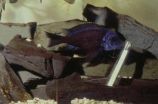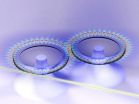VIDEO: The Internet sleeps -- in some parts of the world
Scientists track Internet usage as it pulses across the globe daily
2014-10-20
(Press-News.org) VIDEO:
The Internet "sleeps " -- but not everywhere. Find out why.
Click here for more information.
Researchers studying how big the Internet is have found that it "sleeps," almost like a living creature.
The finding will help scientists and policymakers develop better systems to measure and track Internet outages, such as those that struck the New York area after Hurricane Sandy. Understanding how the Internet sleeps will help them avoid confusing a sleeping Internet with an Internet outage.
"The Internet is important in our lives and businesses, from streaming movies to buying online. Measuring network outages is a first step to improving Internet reliability," said John Heidemann, research professor at the USC Viterbi School of Engineering's Information Sciences Institute (ISI), and the study's corresponding author.
While the Internet is always up and running for some—such as those with broadband access in the United States and Europe—in other areas, people's access to the Internet varies over the course of the day, notably in Asia, South America, and Eastern Europe.
Heidemann collaborated with USC's Lin Quan and Yuri Pradkin on the study, which will be presented at the 2014 ACM Internet Measurements Conference on November 5.
Their study also correlates countries with strong diurnal Internet access with lower GDP– meaning that the richer a country is, the more likely it is that the Internet will be up and running 24/7.
"This work is one of the first to explore how networking policies affect how the network is used," Heidemann said.
There are 4 billion IPv4 internet addresses. Heidemann and his team pinged about 3.7 million address blocks (representing about 950 million addresses) every 11 minutes over the span of two months, looking for daily patterns.
"This data helps us establish a baseline for the Internet — to understand how it functions, so that we have a better idea of how resilient it is as a whole, and can spot problems quicker," Heidemann said.
The team's work is ongoing. "We have grown our coverage to 4 million blocks [more than 1 billion addresses] as Internet use grows," Heidemann said. He hopes that long-term observations will help guide Internet operation.
INFORMATION:
This research was funded by the Department of Homeland Security, Science and Technology Directorate; HSARPA, Cyber Security Division via the Air Force Research Laboratory, Information Directorate and SPAWAR.
VIDEO: http://youtu.be/HHAumsoMG3E
ELSE PRESS RELEASES FROM THIS DATE:
2014-10-20
Fish just want to have fun, according to a University of Tennessee, Knoxville, study that finds even fish "play."
The research is published in the academic journal Ethology and can be viewed at http://bit.ly/1tLunpC.
Gordon Burghardt, a professor in the departments of Psychology and Ecology are Evolutionary Biology, is known for defining "play" in a way that allows us to identify it in species not previously thought capable of play, such as wasps, reptiles and invertebrates.
"Play is repeated behavior that is incompletely functional in the context or at the age ...
2014-10-20
This news release is available in German. Diatoms play an important role in water quality and in the global climate. They generate about one fourth of the oxygen in the Earth's atmosphere and perform around one-quarter of the global CO2 assimilation, i.e. they convert carbon dioxide into organic substances. Their light receptors are a crucial factor in this process. Researchers at the Leipzig University and the Helmholtz Centre for Environmental Research have now discovered that blue and red light sensing photoreceptors control the carbon flow in these algae. These ...
2014-10-20
WASHINGTON, DC – A mass of marine debris discovered in a giant sinkhole in the Hawaiian islands provides evidence that at least one mammoth tsunami, larger than any in Hawaii's recorded history, has struck the islands, and that a similar disaster could happen again, new research finds. Scientists are reporting that a wall of water up to nine meters (30 feet) high surged onto Hawaiian shores about 500 years ago. A 9.0-magnitude earthquake off the coast of the Aleutian Islands triggered the mighty wave, which left behind up to nine shipping containers worth of ocean ...
2014-10-20
Since World War II, more than 45 international human-rights treaties have been signed by many of the world's roughly 200 countries. But why do some states sign such accords, especially if they lack a strong human-rights commitment in the first place?
One prominent idea holds that treaty-ratifying countries are essentially bought off: They agree to lend support to the human-rights movement in exchange for material good, such as foreign aid or more trade. However, a new study co-authored by an MIT political scientist finds that not to be the case; the actions of states, ...
2014-10-20
This news release is available in German. What started out as a mathematical oddity, has now become a new kind of laser technology. Two years ago, physicists at TU Wien predicted a paradoxical laser effect: Under certain conditions, a laser can be switched on not by supplying it with more energy, but by taking energy away from the laser. First experimental signatures of this effect were recently reported at TU Wien. In collaboration with colleagues at Washington University in St. Louis, USA and at Riken, Japan the researchers have now succeeded in transferring the paradoxical ...
2014-10-20
Amsterdam, NL, October 20, 2014 – White Canes provide low-tech assistance to the visually impaired, but some blind people object to their use because they are cumbersome, fail to detect elevated obstacles, or require long training periods to master. Electronic travel aids (ETAs) have the potential to improve navigation for the blind, but early versions had disadvantages that limited widespread adoption. A new ETA, the "EyeCane," developed by a team of researchers at The Hebrew University of Jerusalem, expands the world of its users, allowing them to better estimate ...
2014-10-20
Climate change predictions for the Middle East, like other arid regions of the world, are alarming. In an area known for its water scarcity, rainfall is expected to decrease even further in the near future, spelling disaster for the functioning of unique ecosystems — hotspots of biodiversity and rich genetic fodder for essential crops.
To test these dire predictions, Prof. Marcelo Sternberg of the Department of Molecular Biology and Ecology of Plants at Tel Aviv University's Faculty of Life Sciences, together with ecologists from the University of Tübingen ...
2014-10-20
Older people from Pakistani and Bangladeshi communities in England fear changes in cultural attitudes will leave them without the family care they expect to rely on in their twilight years, a new study has found.
The research, undertaken at Brunel University London, reports that elderly people in these communities expect their children and wider family will look after them in old age and are traditionally unlikely to take-up state social services.
However, those surveyed also expressed uncertainty over whether changes in cultural attitudes and geographical factors ...
2014-10-20
Members of today's younger Net Generation aren't more tech savvy than their teachers just because they were born into a world full of computers. In fact, if it weren't for the coaxing and support of their educators, many students would never use their electronic devices for more than playing games or listening to music. So says Shiang-Kwei Wang of the New York Institute of Technology in the US, who led a study on how middle school science teachers and their students use technology inside and outside the classroom. The findings¹ appear in the journal Educational Technology ...
2014-10-20
ANN ARBOR—In a design that mimics a hard-to-duplicate texture of starfish shells, University of Michigan engineers have made rounded crystals that have no facets.
"We call them nanolobes. They look like little hot air balloons that are rising from the surface," said Olga Shalev, a doctoral student in materials science and engineering who worked on the project.
Both the nanolobes' shape and the way they're made have promising applications, the researchers say. The geometry could potentially be useful to guide light in advanced LEDs, solar cells and nonreflective ...
LAST 30 PRESS RELEASES:
[Press-News.org] VIDEO: The Internet sleeps -- in some parts of the world
Scientists track Internet usage as it pulses across the globe daily






